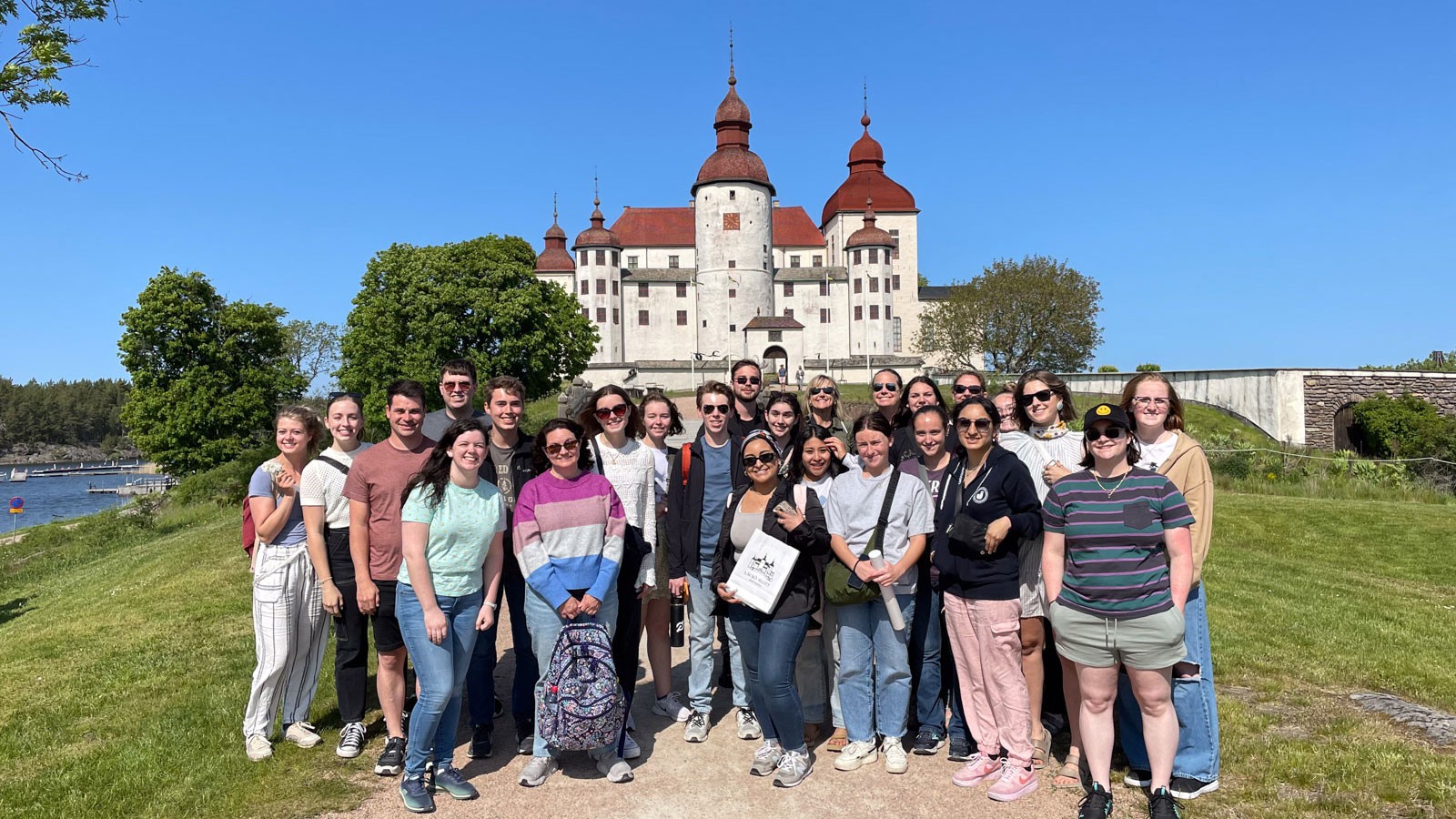Study Abroad in Sweden Gives Students International Insight on Social Services Across the Lifespan
By Allyson Myers |
Twelve USU students from the Emma Eccles Jones College of Education and Human Services and the College of Humanities and Social Sciences took a 10-day summer study abroad trip to the Institute for Gerontology at Jönköping University in Sweden for a full course of classroom learning, field experiences, and cultural immersion in the capitol city of Stockholm.
The study abroad course, titled “Healthcare and Social Services Across the Lifespan” and led by Human Development and Family Studies professor Beth Fauth, has been taught every other year for more than a decade in partnership with the Institute for Gerontology and universities across the U.S. In addition to the USU students who attended this year, 12 students from Indiana University-Southeast and their instructors joined the program as the cohort traveled overseas to learn about a wide array of topics relating to elder care, social services, and child and family policies.
For Anna Perez, one of the attending students, the course meant much more than a trip to Europe. “One of the biggest things for me was, since I’m a first-generation student, it was an accomplishment to be able to travel internationally with my university,” she said. “It felt like I was showing my family what is possible, and showing myself that anything is possible if I put my mind to it.”
Throughout the first five days of the course, attending leaders from the U.S. and experts from the Institute for Gerontology presented on their individual areas of research and practice, including the Swedish educational system, school nursing, dementia care, palliative care, and severe mental health concerns in the elderly. Within these varying topics, students had opportunities to think critically about the systems in place in different parts of the world; for example, one lecture compared how dementia care varies across Sweden, the U.K., and the U.S, and U.S. students specifically examined case studies of the Medicare and Social Security systems.
During the afternoons, students attended site visits to locations such as a nursing home, the geriatric unit of a hospital, various social service centers, and a preschool, where they interacted with residents and patients as well as the facility staff and program directors.
While the course maintains a strong focus on elder care, it has evolved in more recent years to appeal to a broader range of students who are studying healthcare and social services professions outside of gerontology. This year’s participants from USU included undergraduate and graduate students studying nursing, kinesiology, psychology, human development and family studies, social work, and sociology.
Perez, who is studying child development, said that the course units on child policy piqued her interest in the course despite it being geared towards gerontology. On the trip, interacting with patients during site visits and seeing the overall impact of a different health care system led Perez to reflect on her own goals within her field.
“I was able to acknowledge and validate the goals and dreams that I have,” she said. “I realized that I want to eventually establish my own family life education institute. I feel like I always had that desire but always kind of pushed it down. Something about seeing the effects of the health care system really motivated me to accept and solidify that dream.”
Despite the course’s busy itinerary, students still had ample time to enjoy the beautiful scenery and have a true taste of Swedish culture. Their schedule specifically included time for fika, a time to chat with friends and colleagues over coffee, which is a deeply important Swedish custom. On the weekend, students explored a historical restored village and a castle, as well as museums and nearby towns. The final leg of the trip in Stockholm included visits to a cultural outdoor museum and a museum on Sweden’s maritime history, which houses its most famous sunken ship, the Vasa.
“Another thing that I loved was just learning about another way of life,” Perez said. “Expanding my horizons and realizing that my perspective is not the only one, and my culture, my country, is not the only one that matters or that exists. A lot of other places have amazing things to offer.”
Beth Fauth has served as an instructor for this study abroad experience for multiple years. In addition to being a researcher in gerontology, dementia and family caregiving, Fauth has a deep connection to the course itself. The course originally began with Steve Zarit at Pennsylvania State University as a partnership with the Institute for Gerontology due to shared research collaborations.
Zarit was Fauth’s Ph.D. adviser, and she attended the study abroad trip while pursuing her doctorate at Penn State. Years later, she was able to teach the class together with Zarit, and she is excited to continue offering that same experience to her students now. Although Zarit has retired, he provided a lecture via Zoom during the course.
"It feels very full circle to now be teaching the same study abroad course that had such an impact on me during my own education," Fauth said. "Based off of their written assignments, it is clear that students in the course have also learned aspects of health, social care and culture that will influence their education and their future practice for years to come."
WRITER
Allyson Myers
Public Relations and Marketing Assistant
Emma Eccles Jones College of Education and Human Services
allyson.myers@usu.edu
CONTACT
Alicia Richmond
Director of Public Relations & Marketing
Emma Eccles Jones College of Education & Human Services
alicia.richmond@usu.edu
TOPICS
Society 504stories Health 308stories Humanities 117stories Study Abroad 46storiesComments and questions regarding this article may be directed to the contact person listed on this page.







